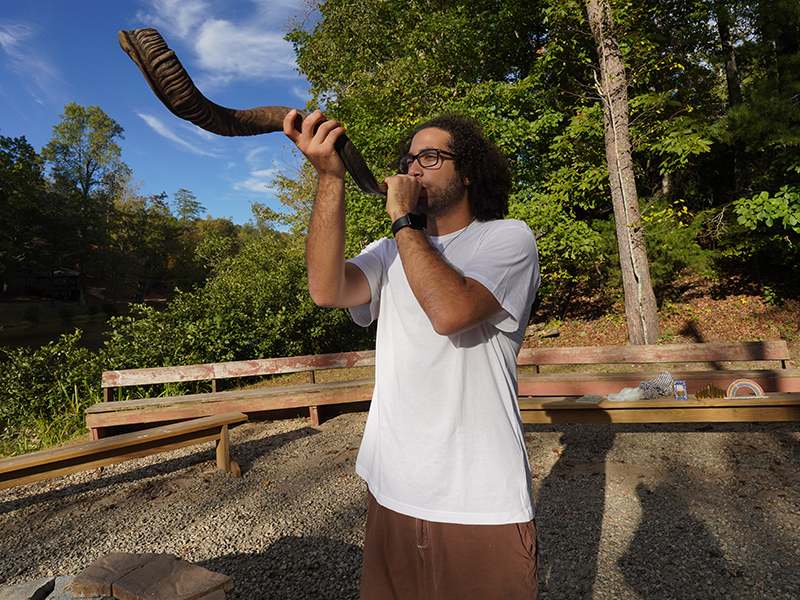
Themes of settling the Land span across the Bible from God’s telling Abraham to, “Go forth to the land I will show you,” in Genesis to the scores of commandments about settling the Land in Deuteronomy. But of all the books of the Torah, I would argue that Exodus, beginning with Parashat Sh’mot, looms largest in its influence over Zionism and present-day concepts of settling the Land that have become implicit in the development of modern Israel’s culture.
These concepts have played - and continue to play - their part in history, but they are based on readings of the text that, I believe, do not ring true today. Here are a few examples of how I understand those texts differently.
1. The Exodus is a spiritual - not a political - journey.
The Exodus themes that get play in Zionism tend to overtell the part of the biblical narrative that deals with nationalism and homesteading, but what emerges from a close reading of Exodus is only, in part, a story of political liberation. Instead, the overarching theme of Exodus tells a story of theological revolution. One need only point to the way we quote one of the most famous biblical verses, found in this week’s parashah, to illustrate how some of us have forgotten the primary, religious purpose of the book. When Moses and Aaron appear before Pharaoh for the first time, they don’t just say in the name of God, “Let My people go”; the full quotation continues, “that they may celebrate a festival for me in the wilderness” (Ex. 5:1). Leaving Egypt - yetziat mitzrayim - is foremost about realizing spiritual destiny, not geographic settlement. This teaching is underscored again and again in the Torah - possession of the Land ultimately is conditional to fulfillment of the commandments.
This Torah perspective is not exactly how the secular Zionists - founders of the State of Israel - understood the historical narrative of the Jewish people as we read in the opening of Israel’s Declaration of Independence:
The Land of Israel was the birthplace of the Jewish people. Here their spiritual, religious and political identity was shaped. Here they first attained to statehood, created cultural values of national and universal significance …
If it’s permissible to create a midrash on Israel’s founding document, a spiritual take on the establishment of the modern Jewish state in its ancestral homeland might read like this:
The Jewish people came together through a spiritual vision in the Land of Israel. Their moral and religious identify-formation first took hold in this land and found political expression through statehood, and the development of cultural values of national and universal significance …
2. Moral quality shapes demographic quantity.
Fertility leading to population growth is a constant theme in the Torah and it has particular importance in the opening chapters of Exodus. The way Exodus narrates the episode of the midwives is an excellent teaching about how moral quality shapes demographic quantity.
There’s a debate among biblical commentators - from antiquity to modernity, from traditional to contemporary scholarship - about the ethnic identity of the midwives. The Hebrew of Ex.1:15 can be understood as, “The king of Egypt spoke to the Hebrew midwives…” or as, “The king of Egypt spoke to the midwives to the Hebrews.” Arguments in favor of the latter line of interpretation are: 1) it doesn’t make sense that Pharaoh would ask Israelite women to murder male babies from their own people (Ex.1:16); 2) there is evidence that “fearing God” (Ex.1:17), the reason the midwives do not do what Pharaoh orders, is a term that biblical tradition assigns to non-Israelites who act morally but don’t live under the obligation of mitzvot (commandments); and 3) when Pharaoh asks the midwives to explain their disobeying of his murderous decree, the excuse they proffer would seem more convincing coming from the mouths of outsiders: “Because the Hebrew women are not like Egyptian women: they are vigorous…” (Ex.1:19). Whatever their motivation or ethnicity, the ethical behavior of the midwives, placing value on human life, acted to save Hebrews lives and help grow the Hebrew people.
3. What it means to grow a people.
The first time the word, am (nation, people) describes the Israelites in the Torah is in the words of Pharaoh: “Look, the Israelite people (lit. the people/nation of the children of Israel) are much too numerous for us” (Ex.1:9). Pharaoh’s negative valuation of demographic threat is turned into a positive directive by the new Jewish State. So much so that, Israel today may be facing an overpopulation crisis in the near future according to Professor Alon Tal in his recent book, The Land Is Full (2016).
According to Tal, it was understood early on that Israel as a Jewish state would need strength in numbers to survive. Aliyah - immigration - would not provide the answer because it would be limited to Jews coming from areas of crisis. Thus, the new Jewish State incentivized having large families. Ben-Gurion’s sexist quip that women with fewer than four children are like draft dodgers is a clear link between fertility and security. Early Israel’s reaction to the Shoah views fertility as a response to the immorality inflicted on the Jewish people: strength in numbers will ward off any new existential threats.
If the Exodus story teaches that population growth is meant to serve a higher purpose, that is also a key to understanding what Israel is grappling with today. As Alon Tal said in a Jerusalem Post interview about his book: “There was a time when [having large families] was important to Israel. Those days are past. We completed that mitzva [i.e., be fertile and multiply]. We have 612 other mitzvot.”
In addition to the issues of population size versus natural resources that Tal emphasizes in his book, he also raises the issues of sexism, racism, and classism that come from policies that treat fertility as the overriding goal in nation-building.
One example of how these tensions played out - and, still play out - is contained in famous 1970s Israeli song, “Children are Happiness” (Yeladim Zeh Simcha), performed by the band Habreira Ha-Tiv’it (Natural Selection). This song and this band, led by singer Shlomo Bar, was all about how the Jews from Mizrachi (North African and Middle Eastern) backgrounds were used to serve the political agenda of the Ashkenazi (Eastern European) elite that governed the modern State of Israel almost exclusively for its first 20 years.
Impoverished families needed the tax credits for children more than financially stable families did. Through these monetary incentives and PR campaigns, poorer and less-educated Jewish families from North Africa and the Middle East were persuaded to shoulder the burden of the state’s plan for Jewish population growth according to the opening lyrics of the song (translated by me):
Have two, have three
Have four children
Get public housing with foyer and kitchen
Have four, have five
Have six children
You all will get joy and respect from the relatives
You love children!
Children are happiness
Children are blessing
You all have a heart of gold
It’s written in the Torah
Perhaps in the Talmud
Go and ask your rabbi!
In Israel - and elsewhere - it’s time to turn our focus toward spiritual growth and the development and furtherance of our moral capacity to understand and follow the mitzvot. May our Exodus journey be our guide.
Rabbi Reuven Greenvald is the director of Israel engagement for the Union for Reform Judaism (URJ).
 In his commentary on Parashat Sh’mot, Rabbi Reuven Greenvald focuses in part on the issue of demography. The expansion of the Israelite community described in the Torah portion is threatening to Pharaoh and is followed by his murderous decree. Many years later, the Zionist movement lauded population growth based on the need to build the Jewish homeland. In the course of establishing the State of Israel, early government policies were sometimes unfair to certain segments of the Jewish community. Although these policies were not violent in nature like Pharaoh’s decree, both situations demonstrate the pitfalls of a relentless focus on demography. The old adage may state that demography is destiny, but far more important to the destiny of a nation is how this goal is balanced with morality.
In his commentary on Parashat Sh’mot, Rabbi Reuven Greenvald focuses in part on the issue of demography. The expansion of the Israelite community described in the Torah portion is threatening to Pharaoh and is followed by his murderous decree. Many years later, the Zionist movement lauded population growth based on the need to build the Jewish homeland. In the course of establishing the State of Israel, early government policies were sometimes unfair to certain segments of the Jewish community. Although these policies were not violent in nature like Pharaoh’s decree, both situations demonstrate the pitfalls of a relentless focus on demography. The old adage may state that demography is destiny, but far more important to the destiny of a nation is how this goal is balanced with morality.
Sh’mot opens by recounting the progeny of our forefather Jacob, and then zooming out from the growth of a single family to the rise of a whole people. “But the Israelites were fertile and prolific; they multiplied and increased very greatly, so that the land was filled with them” (Exodus 1:7); in the Hebrew text there are seven words or phrases (the translation is bolded) that emphasize the magnitude of their growth. Though there are biological explanations for this expansion, ultimately, it reflects God’s promise to Abraham to make of him a great nation. As the Israelites become as numerous as the stars of the heavens, they also become fearsome to surrounding nations. It is a necessary consequence of the fulfillment of God’s promise that our people must possess a homeland.
And yet, Sh’mot reminds us that while the obsession with our population growth caused fear for many Egyptians, others tempered this panic with a focus on moral action. It was with the assistance of non-Israelites, three courageous and upstanding women, that God’s promise to our people was fulfilled. Shiphrah and Puah ignore Pharaoh’s command and act courageously to save the Israelite babies. Pharaoh’s own daughter, in full view of her maidens, brings Moses out of the water and reunites the baby with his mother, if only for his infancy. These women are compassionate, standing in defiance of an immoral decree. Particularly when we consider that women are often mobilized to fight in demographic battles, their refusal to give in to a narrative of fear and dehumanization is laudable.
It is upon this model that governments can reflect when they engage in discussions of demography. For example, in the State of Israel today, the Jewish people is numerous, and it remains necessary for us to have both a safe-haven and a thriving homeland. But more than seeking to numerically build up the state, the important issue today is how to morally inhabit this Land and relate to others living within it. How can we balance the importance of inhabiting our homeland with the moral charge to demonstrate fairness and compassion toward others? It was through the grace and care of non-Israelites that our greatest biblical hero survived and led us out of Egypt, the narrow place. It is time to move beyond a narrow focus on demography, to conduct conversations, and to build policies in Israel based on the kindness of the Egyptian women. May we all learn to be defiant in the face of fear and to act from a place of divine compassion.
Chelsea Feuchs is a rabbinic student at Hebrew Union College-Jewish Institute of Religion in Jerusalem. She previously served as the communications and social media associate for ARZA, the Association of Reform Zionists of America.
Sh’mot, Exodus 1:1−6:1
The Torah: A Modern Commentary, pp. 382−414; Revised Edition, pp. 343–374
The Torah: A Women’s Commentary, pp. 305–330
Haftarah, Isaiah 27:6–28:13; 29:22−23
The Torah: A Modern Commentary, pp. 692−695; Revised Edition, pp. 375−378
Explore Jewish Life and Get Inspired
Subscribe for Emails



